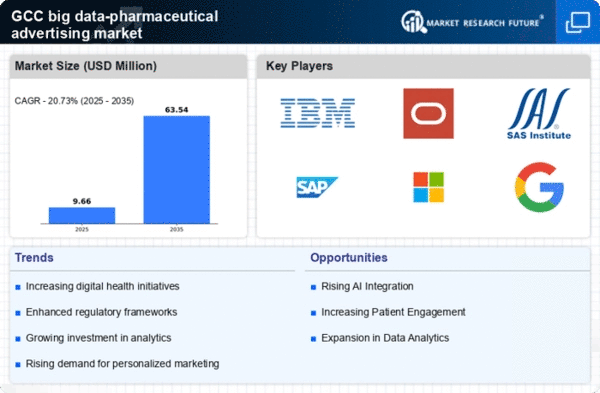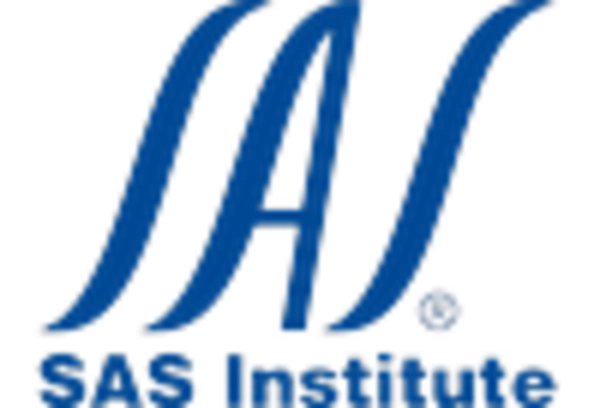Enhanced Customer Insights
Enhanced customer insights are becoming increasingly vital in the big data-pharmaceutical-advertising market. The ability to gather and analyze customer data enables pharmaceutical companies to understand patient needs and preferences better. In the GCC, the market for pharmaceuticals is expected to reach $30 billion by 2026, driven by a growing population and increased healthcare spending. This growth necessitates a deeper understanding of customer behavior, which can be achieved through big data analytics. By employing advanced analytics tools, companies can segment their audience more effectively and tailor their advertising strategies accordingly. This not only improves customer engagement but also increases the likelihood of successful product launches. As the demand for personalized healthcare solutions rises, the focus on customer insights will likely play a crucial role in shaping the strategies within the big data-pharmaceutical-advertising market.
Data-Driven Decision Making
The increasing reliance on data-driven decision making is a pivotal driver in the big data-pharmaceutical-advertising market. Companies are leveraging vast amounts of data to inform their marketing strategies, leading to more effective campaigns. In the GCC, the pharmaceutical sector is projected to grow at a CAGR of 7.5% from 2025 to 2030, indicating a robust demand for data analytics. This growth is largely fueled by the need for precise targeting and improved customer engagement. By utilizing big data analytics, pharmaceutical companies can identify trends, optimize their advertising spend, and enhance their return on investment. The ability to analyze patient data and market trends allows for tailored marketing efforts, which is essential in a competitive landscape. As a result, the emphasis on data-driven strategies is likely to continue shaping the future of the big data-pharmaceutical-advertising market.
Collaboration with Technology Partners
Collaboration with technology partners is emerging as a key driver in the big data-pharmaceutical-advertising market. Pharmaceutical companies are increasingly seeking partnerships with tech firms to enhance their data capabilities and marketing effectiveness. In the GCC, such collaborations are expected to facilitate the integration of advanced technologies like artificial intelligence and machine learning into marketing strategies. This synergy can lead to more efficient data processing and improved targeting of advertising efforts. By leveraging the expertise of technology partners, pharmaceutical companies can access innovative solutions that enhance their operational efficiency. This trend suggests a shift towards a more collaborative approach in the industry, where partnerships are likely to play a crucial role in shaping the future landscape of the big data-pharmaceutical-advertising market.
Regulatory Compliance and Data Security
Regulatory compliance and data security are critical drivers in the big data-pharmaceutical-advertising market. As data privacy regulations become more stringent, pharmaceutical companies must ensure that their data handling practices comply with local laws. In the GCC, the implementation of data protection regulations is expected to increase, compelling companies to invest in secure data management systems. This focus on compliance not only protects patient information but also enhances the credibility of pharmaceutical brands. Moreover, the cost of non-compliance can be substantial, potentially leading to fines and reputational damage. Therefore, investing in robust data security measures is essential for companies operating in the big data-pharmaceutical-advertising market. This trend indicates a growing awareness of the importance of ethical data usage and the need for transparency in advertising practices.
Technological Advancements in Data Analytics
Technological advancements in data analytics are significantly influencing the big data-pharmaceutical-advertising market. The emergence of sophisticated analytics tools and platforms enables pharmaceutical companies to process and interpret large datasets more efficiently. In the GCC, the adoption of cloud-based analytics solutions is on the rise, allowing for real-time data processing and insights generation. This shift is expected to enhance the agility of marketing strategies, enabling companies to respond swiftly to market changes. Furthermore, the integration of predictive analytics can help forecast market trends and consumer behavior, providing a competitive edge. As technology continues to evolve, the capabilities of data analytics will likely expand, further driving innovation within the big data-pharmaceutical-advertising market.

















